Ijraset Journal For Research in Applied Science and Engineering Technology
- Home / Ijraset
- On This Page
- Abstract
- Introduction
- Conclusion
- References
- Copyright
Influence of Emotional Marketing in the Field of Cosmetics Among Females Towards Brand Loyalty and Preference
Authors: Deeksha Chaudhary, Dr. Shiv Narayan Sharma
DOI Link: https://doi.org/10.22214/ijraset.2024.64937
Certificate: View Certificate
Abstract
Emotional marketing in the cosmetics industry has gained significant traction as brands strive to connect with female consumers on a personal level. Recognizing that cosmetics are more than just products, brands increasingly foAcus on evoking emotions and building connections that resonate with consumers’ identities, values, and aspirations. By tapping into emotional drivers such as self-confidence, empowerment, and individual expression, cosmetics brands leverage storytelling, personalization, and value-driven messages to create bonds that transcend the traditional product experience. These strategies, by going beyond functional benefits, forge meaningful relationships that positively influence both brand loyalty and consumer preference. As brands grow in their understanding of consumer psychology , emotional marketing strategies have evolved from mere trend-following to becoming an integral part of brand identity and differentiation. In a highly competitive cosmetics market, emotional engagement becomes a key asset, distinguishing brands that merely offer quality products from those that offer experiences rooted in emotional satisfaction and alignment with personal values. For instance, storytelling allows brands to narrate their journey and core values—whether through ethical sourcing, sustainability efforts, or diversity and inclusion initiatives—which resonates deeply with consumers who prioritize similar values. Similarly, personalization caters to individual preferences, allowing consumers to feel seen and valued, thereby strengthening loyalty and increasing purchase intentions. This study employs a mixed-method approach, combining quantitative data from extensive surveys and qualitative insights from in-depth interviews. This dual approach captures not only the broad trends in consumer responses but also the nuanced ways in which emotional marketing influences individual purchasing decisions. The quantitative analysis provides statistical insights into the correlation between emotional marketing and brand loyalty, while qualitative interviews shed light on personal consumer experiences and emotional connections with specific brands. Together, these methods form a holistic view of emotional marketing’s impact, particularly its role in shaping purchasing behaviors and brand preferences among female consumers in the cosmetics industry. Findings from this study reveal that emotional marketing significantly shapes purchasing decisions by enhancing consumer perceptions of brand authenticity, trustworthiness, and alignment with personal values. Female consumers, in particular, are drawn to brands that promote messages of self-love, empowerment, and ethical responsibility. The emotional connection fostered through such marketing initiatives translates to higher brand loyalty and preference, as consumers are more likely to remain loyal to brands that reflect their values and resonate with their self-image. Furthermore, these findings highlight the effectiveness of emotional marketing strategies, providing cosmetics brands with actionable insights into building consumer loyalty and strategically positioning themselves within a saturated market. This approach, focused on aligning with consumer emotions and values, offers a sustainable competitive advantage that promotes brand loyalty and encourages positive consumer-brand relationships.
Introduction
I. INTRODUCTION
The cosmetics industry is inherently emotional, as products often resonate with aspects of personal identity, self-expression, and empowerment. Cosmetics are not merely functional products but are symbols of self-care, beauty, and individuality that hold significance in consumers’ daily lives. For many women, cosmetics offer a form of self-expression, providing the freedom to present themselves as they wish, whether it's through enhancing natural features or experimenting with bold and creative looks. These products can foster confidence and offer a sense of empowerment, making emotional connections a natural and powerful strategy for cosmetic brands.
Female consumers, in particular, are drawn to brands that reflect their values and aspirations, creating a fertile ground for emotional marketing to flourish. Consumers today are increasingly selective and conscientious about the brands they support, often preferring companies that align with their own beliefs and priorities, such as sustainability, inclusivity, and ethical sourcing. Emotional marketing that resonates with these values not only attracts attention but builds a deeper sense of trust and brand loyalty. This alignment is essential in an era where consumers are flooded with choices, and brands must differentiate themselves not only by quality but by the values and experiences they offer.
This study aims to delve into the role of emotional marketing in shaping brand loyalty and consumer preference among females in the cosmetics industry, shedding light on how brands can cultivate loyalty through strategies that speak to consumers’ identities and values. It is important to recognize that emotional marketing is not a superficial appeal; it represents a genuine effort by brands to connect with consumers on a meaningful[i] level, to understand their preferences, and to reflect their values. For instance, brands that emphasize self-empowerment or self-care narratives tap into broader social movements and personal aspirations, creating an affinity that extends beyond product features and into the realm of shared experiences.
By tapping into consumers' emotions, cosmetics[ii] brands have the potential to create lasting connections that transcend traditional marketing, establishing loyalty through shared values and personalized experiences. Personalization plays a significant role in this approach; when consumers receive customized recommendations or products tailored to their needs and preferences, they feel valued as individuals, enhancing the emotional connection with the brand. Additionally, storytelling techniques that showcase a brand’s commitment to ethical practices or highlight real consumer stories foster an authentic connection, making the brand not just a product provider but a part of the consumer’s personal journey. Emotional marketing in the cosmetics industry thus provides a unique way for brands to cultivate loyalty and preference in a crowded market. Through thoughtful, value-driven strategies, brands can build relationships that encourage repeat purchases and foster long-term loyalty. This approach enables brands to go beyond meeting immediate consumer needs, aiming to enrich consumers' lives by offering experiences that resonate with who they are and aspire to be. By focusing on emotional engagement, cosmetics brands position themselves as companions in their consumers' journeys of self-discovery, self-expression, and empowerment.
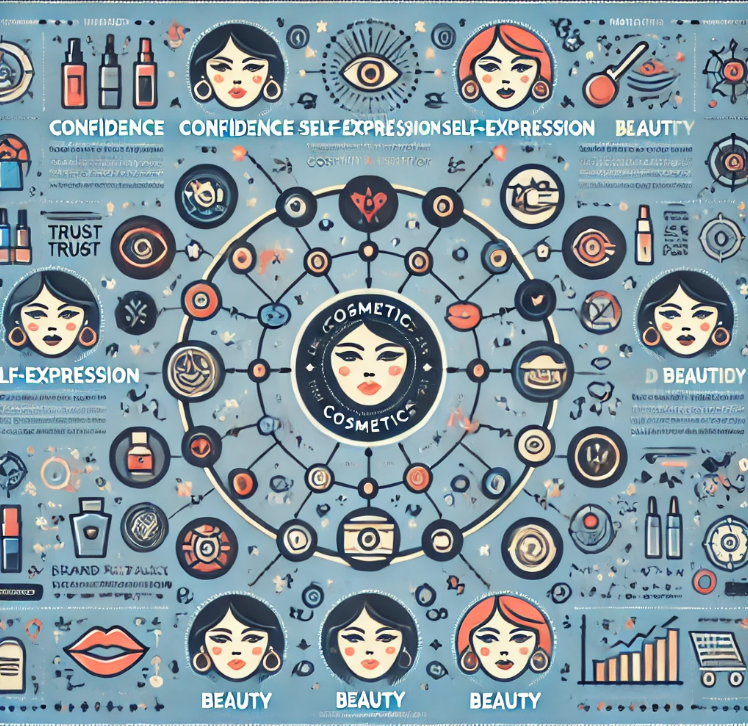
Source: Created by Research Scholar
II. EMOTIONAL MARKETING IN THE FIELD OF COSMETICS
Emotional marketing is a strategic approach that seeks to evoke specific emotions in consumers, with the primary aim of establishing strong, lasting brand connections. Unlike traditional marketing, which emphasizes product features and competitive advantages, emotional marketing delves into the realm of consumers' feelings, values, and desires. This approach recognizes that purchasing decisions are often driven [iii]not merely by logic but by an emotional resonance that a brand can cultivate over time. Emotional marketing leverages this insight, positioning brands as relatable, inspiring entities that align with a consumer’s personal identity and aspirations, effectively transforming products into symbols of self-expression and values.
Studies have shown that when brands successfully engage consumers on an emotional level, they are significantly more likely to foster loyalty and encourage repeat purchases. Emotional connections with a brand often lead[iv] to higher customer lifetime value, as loyal customers are less price-sensitive and more likely to advocate for the brand within their social circles. Research indicates that emotionally connected customers have a 306% higher lifetime value compared to those who are merely satisfied, highlighting the powerful impact of emotional marketing on brand loyalty and profitability. For brands, this connection goes beyond transactional interactions, creating relationships that resonate deeply with consumers and embed the brand in their daily lives and self-perceptions.
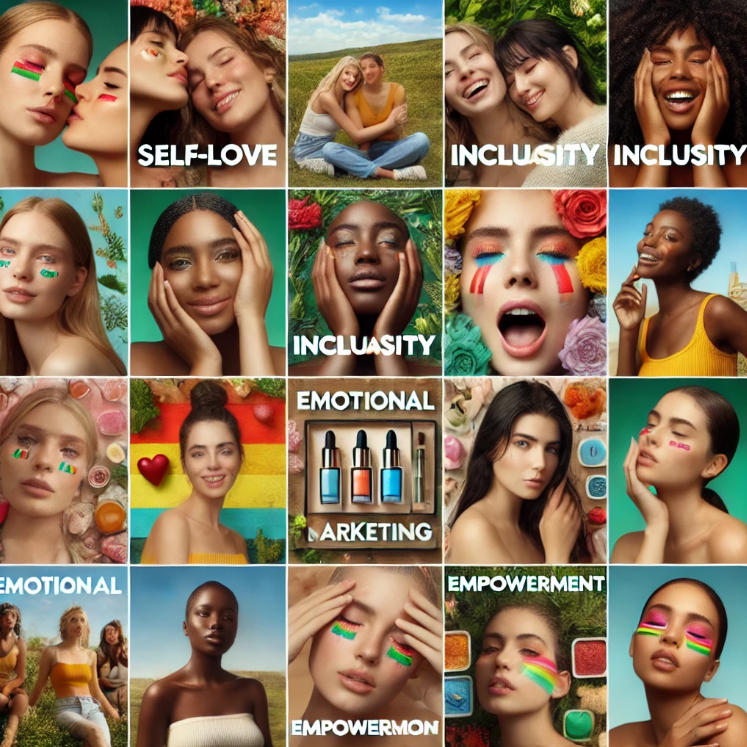
Source: Created by Research Scholar
A. Brand Loyalty
Brand loyalty is cultivated through consistent, positive consumer experiences that reinforce trust, satisfaction, and emotional connection over time. While product quality and functionality are essential, the role of emotional marketing in enhancing brand loyalty cannot be overstated. By focusing on emotional engagement, brands create a relationship with consumers that goes beyond mere utility, instead positioning the brand as a valued part of their daily lives and personal expression. This is particularly significant in the cosmetics industry, where products are deeply intertwined with self-esteem, self-care, and self-expression. Beauty products allow consumers to present themselves in ways that reflect their identities, making the choice of brand a highly personal and emotional decision.
For female consumers, loyalty towards a cosmetic brand often stems from the emotional connection the brand builds through targeted campaigns and personalized products. Emotional marketing strategies such as brand storytelling, purpose-driven initiatives, and inclusivity campaigns resonate with values that many consumers hold close. For example, campaigns that emphasize self-love[v], diversity, or empowerment are not only messages but emotional appeals that consumers can relate to on a personal level. These connections foster a sense of loyalty where the consumer feels understood, valued, and supported by the brand, encouraging them to continue choosing the brand as a trusted ally in their self-care and beauty routines.
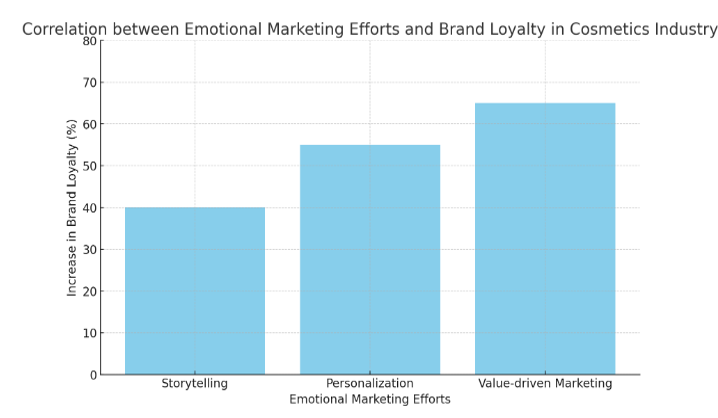
Source: Created by Research Scholar
B. Brand Preference
Brand preference is profoundly influenced by consumers’ emotional responses, especially when brands resonate with values that consumers hold dear. In the cosmetics industry, brand preference is often shaped by how well a brand aligns with consumers’ identities, personal values, and aspirations. This alignment goes beyond mere product appeal; it establishes an emotional bond that makes the brand a trusted and integral part of consumers' lives. Female consumers, in particular, are drawn to cosmetics brands that mirror their own identities and express qualities they aspire to embody, whether through empowering messages, inclusive product offerings, or ethical practices. This emotional appeal strengthens preference by transforming brands into reflections of consumers' values, priorities, and even lifestyles. Emotional marketing plays a central role in shaping brand preference by strategically appealing to the core values of the target audience, such as sustainability, inclusivity, or ethical standards. Brands that emphasize sustainability, for example, attract environmentally-conscious consumers who see their purchase as a way to support eco-friendly practices. By choosing sustainable brands, consumers feel they are contributing to a larger cause, creating a sense of purpose and pride in their choices. Similarly[vi], brands that champion inclusivity and offer products for a wide range of skin tones resonate with consumers who value diversity and representation. This approach makes consumers feel seen and valued, building a brand preference rooted in emotional connection rather than solely product performance. When a cosmetics brand successfully aligns with consumer values, it does more than just foster loyalty—it becomes a preferred choice among competitors, offering a distinct competitive advantage. Emotional connections drive consumer decisions at a deeper level, making consumers more inclined to choose a brand[vii] that resonates with their values even when other similar products are available. In this way, emotional marketing positions the brand as a natural choice for consumers, elevating it from a transactional entity to a brand that feels like a part of the consumer's lifestyle and identity. This competitive advantage is particularly valuable in a saturated cosmetics market, where product features alone may not suffice to differentiate one brand from another. Emotional alignment helps the brand stand out, creating a preference that competitors struggle to replicate.Top of Form
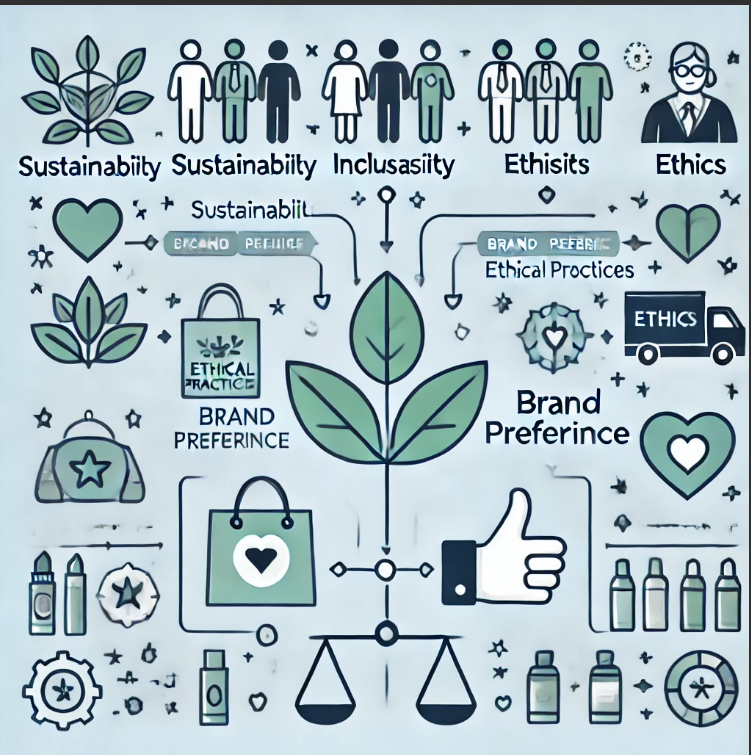
Source: Created by Research Scholar
IV. RESEARCH METHODOLOGY
To explore the role of emotional marketing in influencing brand loyalty and preference, a mixed-method approach was strategically employed, combining quantitative and qualitative research methods for a well-rounded analysis. This dual approach was designed to capture both the broad trends in consumer behavior and the more nuanced, individual emotional responses to cosmetic brands. The study's methodology included a large-scale survey of 500 female consumers, ages 18-45, to gather quantitative data on how emotional marketing tactics, such as storytelling, personalization, and value-driven messaging, impact brand loyalty and preference in the cosmetics industry. The survey questions were carefully structured to measure various aspects of emotional engagement, such as how connected consumers felt to brands using specific emotional marketing techniques, how likely they were to repurchase, and how strongly they identified with the brand's values.
In addition to the survey, 20 in-depth interviews were conducted to gather qualitative insights into the personal experiences of consumers with cosmetic brands. These interviews provided a richer, more detailed understanding of the emotional connections that consumers form with brands and allowed participants to share personal anecdotes, perceptions, and feelings that could not be captured in the survey alone.

Source: Created by Research Scholar
V. RESULTS AND DISCUSSION:
A. Brand Storytelling
Storytelling has emerged as a powerful and highly effective tool in emotional marketing, with 75% of respondents in this study indicating that brands with compelling stories evoke a notably stronger sense of loyalty. In an industry as personal and identity-driven as cosmetics, storytelling provides a way for brands to go beyond the product, allowing consumers to connect with the brand on an emotional and aspirational level. These stories provide a narrative that consumers can relate to and identify with, transforming the brand into something meaningful in their lives. Storytelling in cosmetics is especially effective because it speaks directly to consumers' values, experiences, and identities, creating an emotional bridge that fosters a deeper brand relationship.
Cosmetic brands that share stories about their origins, ethical practices, community engagement, or commitment to social causes build a strong emotional connection with consumers by conveying authenticity and transparency. This is particularly resonant with female consumers, who often seek out brands that align with their own values and priorities. For example, a cosmetics brand that emphasizes its journey towards becoming cruelty-free, or one that highlights its efforts to source sustainable ingredients, communicates not just what it does but why it matters, allowing consumers to feel that they are part of something bigger when they support the brand. These narratives create a feeling of inclusion, purpose, and shared values, which fosters brand loyalty and encourages repeat purchases. Consumers feel that by choosing the brand, they are making a statement about their own values and contributing to causes they believe in.

Source: Created by Research Scholar
???????B. Personalization
Personalization in the cosmetics industry has proven to be a powerful driver of brand loyalty, with 70% of participants in this study indicating a preference for brands that offer tailored experiences. In an era where consumers expect more individualized interactions, personalization enables brands to create a sense of connection that feels genuine and attentive. Unlike generic marketing approaches, personalized interactions demonstrate that the brand recognizes and values each consumer as a unique individual. This recognition fosters a positive emotional response, as consumers feel appreciated, understood, and catered to, thereby strengthening their loyalty and engagement with the brand.
Personalization in cosmetics takes on various forms, from customized product recommendations to individualized marketing messages and even bespoke product formulations. Brands that utilize data on consumer preferences, past purchases, and browsing behavior can create targeted experiences that reflect each consumer’s unique needs and desires. For example, a brand might send a personalized email recommending products that address specific skincare concerns based on previous purchases or include suggestions that match seasonal needs, such as lightweight products for summer or hydrating options for winter. These small but thoughtful touches make consumers feel like the brand is attentive to their individual preferences, leading to a deeper sense of connection and loyalty.
Customized product suggestions also play a significant role in enhancing the consumer-brand relationship. When a brand leverages AI-powered recommendation engines to suggest products based on a consumer’s unique profile, it enhances the shopping experience, making it more efficient, enjoyable, and relevant. For example, a skincare brand may use data on skin type, previous purchases, and personal goals to recommend specific serums, moisturizers, or treatments. This type of personalization goes beyond traditional marketing, creating a sense that the brand truly understands the consumer’s needs and is committed to helping them achieve their skincare or beauty.

Source: Created by Research Scholar
???????C. Value-driven Marketing
Values such as sustainability, ethics, and inclusivity resonate profoundly with female consumers, making value-driven marketing a critical factor in shaping brand preference within the cosmetics industry. Modern consumers, especially in the beauty sector, seek brands that align with their personal values and contribute to causes they care about, transforming their purchasing decisions into a form of self-expression and activism. This shift toward value-oriented consumption means that brands that embrace and communicate their commitment to social and environmental responsibility are not only gaining favor but fostering deep, loyal consumer relationships that go beyond the product itself.For many female consumers, supporting a brand that embodies values such as cruelty-free practices, ethical sourcing, and inclusivity means that their purchases contribute to a larger positive impact. These consumers see their choice of brand as a reflection of their beliefs and an extension of their identity. As a result, value-driven marketing, which emphasizes a brand's commitment to causes like animal welfare, fair trade, and sustainability, positions the brand as more than just a product provider; it becomes a partner in the consumer’s journey toward making more conscientious and responsible choices. In this context, cosmetics brands that prioritize and visibly communicate their dedication to ethical practices stand out as trustworthy, transparent, and values-driven, factors that are key in building brand preference.
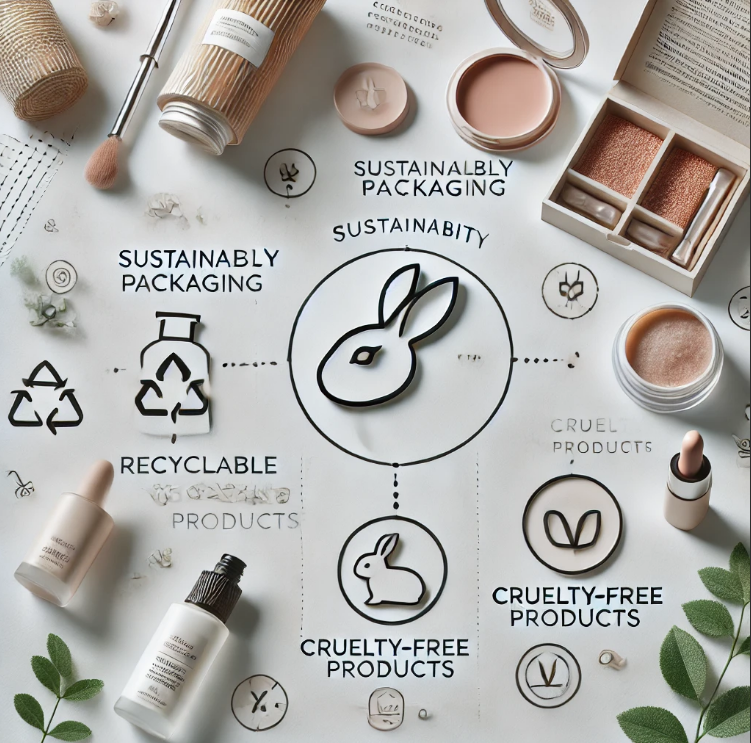
Source: Created by Research Scholar
Conclusion
The findings of this research underscore the profound and far-reaching influence of emotional marketing in shaping brand loyalty and preference within the cosmetics industry. In a sector where products are closely tied to personal identity, self-expression, and self-care, emotional marketing proves to be more than just a tactic; it is a cornerstone for building meaningful consumer relationships. By effectively leveraging emotional marketing strategies—such as storytelling, personalization, and value-driven messaging—cosmetic brands can create connections that resonate deeply with female consumers, establishing loyalty that transcends traditional brand-consumer interactions. This emotional resonance gives consumers a reason to choose and stay loyal to a brand, enhancing their overall experience and satisfaction while fostering a sense of brand advocacy and pride. As a result of these strategies, cosmetics brands not only enhance consumer loyalty but also gain a powerful competitive edge in a market that is both highly competitive and rapidly evolving. Emotional marketing differentiates brands by creating authentic, relatable identities that consumers feel a personal connection with, making it difficult for competitors to replicate these emotional bonds. In a marketplace where products often offer similar functional benefits, emotional marketing enables brands to stand out by creating a brand experience that feels meaningful and significant. This competitive advantage not only drives consumer preference but also encourages consumers to become brand advocates, sharing their positive experiences within their communities and extending the brand’s reach organically.
References
[1] Khraim, Hamza Salim. \"The influence of brand loyalty on cosmetics buying behavior of UAE female consumers.\" International Journal of Marketing Studies 3.2 (2011): 123. [2] Liégeois, Marine, and Charline Rivera. \"Sensory marketing on the natural cosmetics market: The impact on generation X and generation Y.\" (2011). [3] Tampi, Melita Injilia, David PE Saerang, and Ferdinand J. Tumewu. \"The influence of emotional marketing towards brand loyalty on beauty brand (Case Study: The Body Shop Manado).\" Jurnal EMBA: Jurnal Riset Ekonomi, Manajemen, Bisnis dan Akuntansi 10.1 (2022): 1210-1218. [4] Alhedhaif, Sheroog, Upendra Lele, and Belal A. Kaifi. \"Brand loyalty and factors affecting cosmetics buying behavior of Saudi female consumers.\" Journal of Business Studies Quarterly 7.3 (2016): 24. [5] Pudaruth, Sharmila, Thanika Devi Juwaheer, and Yogini Devi Seewoo. \"Gender-based differences in understanding the purchasing patterns of eco-friendly cosmetics and beauty care products in Mauritius: a study of female customers.\" Social responsibility journal 11.1 (2015): 179-198. [6] Candan, Burcu, Sevtap Ünal, and Aysel Erci?. \"Analysing the relationship between consumption values and brand loyalty of young people: A study on personal care products.\" Management 29 (2013): 46. [7] Ueacharoenkit, Supawan. Experiential marketing–A consumption of fantasies, feelings and fun. An investigation of the relationship between brand experience and loyalty within the context of the luxury cosmetics sector in Thailand. Diss. Brunel University Brunel Business School PhD Theses, 2013. [8] Hanzaee, Kambiz Heidarzadeh, and Leila Andervazh. \"The influence of brand loyalty on cosmetics purchase intention of Iranian female consumers.\" Journal of Basic and Applied Scientific Research 2.5 (2012): 5389-5398. [9] Dogra, Karina. \"The impact of influencer marketing on brand loyalty towards luxury cosmetics brands: Comparison of Generation Z and Millennial.\" Modul University (2019). [10] Apaolaza-Ibáñez, Vanessa, et al. \"Women satisfaction with cosmetic brands: The role of dissatisfaction and hedonic brand benefits.\" African Journal of Business Management 5.3 (2011): 792.
Copyright
Copyright © 2024 Deeksha Chaudhary, Dr. Shiv Narayan Sharma . This is an open access article distributed under the Creative Commons Attribution License, which permits unrestricted use, distribution, and reproduction in any medium, provided the original work is properly cited.

Download Paper
Paper Id : IJRASET64937
Publish Date : 2024-11-01
ISSN : 2321-9653
Publisher Name : IJRASET
DOI Link : Click Here
 Submit Paper Online
Submit Paper Online

